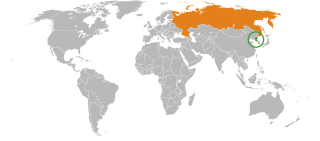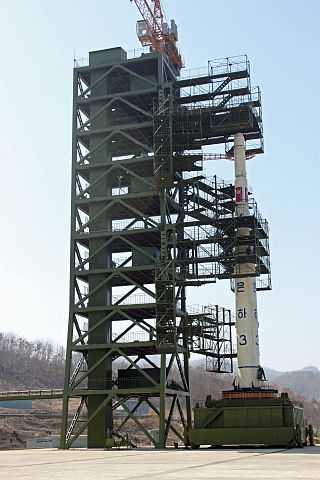Related Research Articles

United Nations Security Council Resolution 1695, adopted unanimously on July 15, 2006, banned the selling of material that would further the ability of the Democratic People's Republic of Korea to bolster its ballistic missiles programme. Resolution 1695 was adopted after recalling resolutions 825 (1993) and 1540 (2004) concerning North Korea and the non-proliferation of weapons of mass destruction, respectively.

Arbitration is a formal method of dispute resolution involving a third party neutral who makes a binding decision. The third party neutral renders the decision in the form of an 'arbitration award'. An arbitration award is legally binding on both sides and enforceable in local courts, unless all parties stipulate that the arbitration process and decision are non-binding.

HFW is a global, sector-focused law firm providing services to businesses in aerospace, commodities, construction, energy and resources, insurance and reinsurance, and shipping. The firm was founded in 1883 and now has more than 600 lawyers, including 170 partners, based in 20 offices across the Americas, Europe, the Middle East, Asia and Australia.

United Nations Security Council Resolution 1718 was adopted unanimously by the United Nations Security Council on October 14, 2006. The resolution, passed under Chapter VII, Article 41, of the UN Charter, imposes a series of economic and commercial sanctions on the Democratic People's Republic of Korea in the aftermath of that nation's claimed nuclear test of October 9, 2006.

Milbank LLP is an international law firm headquartered in New York City. It also has offices in Washington, D.C., Los Angeles, London, Frankfurt, Munich, Tokyo, Hong Kong, São Paulo, Seoul, Singapore, and Beijing.

The Soviet Union was the first to recognize North Korea on October 12, 1948, shortly after the proclamation, as the sole legitimate authority in all of Korea. The Soviet Union supported North Korea during the Korean War. North Korea was founded as part of the Communist bloc, and received major Soviet military and political support. The comprehensive personality cult around North Korea's ruling family was heavily influenced by Stalinism. China and the Soviet Union competed for influence in North Korea during the Sino-Soviet split in the 1960s, as North Korea tried to maintain good relations with both countries.
The Arbitration Roundtable of Toronto is made up of several litigators, academics, arbitrators, and mediators from the Greater Toronto Area. The group promotes arbitration as an alternative method of conflict resolution over litigation, especially in commercial suits. Members include commercial litigators from Toronto law firms including some of the Seven Sisters of Bay Street. Each member has experience and interest in promoting commercial Arbitration. The group dedicates its time to encouraging this form of Dispute resolution through seminars, papers, and talks.

United Nations Security Council Resolution 1874 was adopted unanimously by the United Nations Security Council on 12 June 2009. The resolution, passed under Chapter VII, Article 41, of the UN Charter, imposes further economic and commercial sanctions on the Democratic People's Republic of Korea and encourages UN member states to search North Korean cargo, in the aftermath of an underground nuclear test conducted on 25 May 2009.

AllBright Law Offices is a Shanghai-based Chinese law firm ranked the seventh largest in the country and eighth largest in Asia by number of lawyers. Among national corporate law firms, AllBright is the only one headquartered in Shanghai.
Felix Abt is a Swiss business affairs specialist on North Korea and Vietnam.

India–North Korea relations, also called Indian-North Korean relations or Indo-North Korean relations, are the bilateral relations between India and North Korea. Both countries have growing trade and diplomatic relations. India maintains an embassy in Pyongyang, and North Korea has an embassy in New Delhi.

Rajah & Tann Singapore LLP is a Singaporean law firm with affiliate offices in Cambodia, China, Indonesia, Laos, Malaysia, Myanmar, Philippines, Thailand and Vietnam. Founded in 1976, the firm is regarded as one of the Big Four law firms in Singapore. It is a member firm of Rajah & Tann Asia, a network of law firms in Southeast Asia with over 970 fee earners.

Kwangmyŏngsŏng-3 was a North Korean Earth observation satellite which, according to the DPRK, was for weather forecast purposes, and whose launch was widely portrayed in the West to be a veiled ballistic missile test. The satellite was launched on 13 April 2012 at 07:39 KST aboard the Unha-3 carrier rocket from Sohae Satellite Launching Station. The rocket exploded 90 seconds after launch near the end of the firing of the first stage of the rocket. The launch was planned to mark the centenary of the birth of Kim Il Sung, the founder of the republic. On 1 December 2012 North Korea announced that a replacement satellite would be launched between 10 and 22 December 2012. After a delay and extending the launch window to 29 December, the rocket was launched on 12 December 2012.

The law of North Korea is a codified civil law system inherited from the Japanese and influenced by the Soviet Union. It is governed by The Socialist Constitution and operates within the political system of North Korea.

Herbert Smith Freehills (HSF) is a global law firm with headquarters in London, England and Sydney, Australia. HSF has been widely acknowledged as one of the world's most elite and selective law firms, and, as of 2024, was the 33rd largest by revenue. It was formed on 1 October 2012 by a merger between the United Kingdom-based Herbert Smith founded in 1882, then a member of the Silver Circle of leading UK law firms, and Freehills founded in 1852, one of the Big Six Australian law firms.

Han Kun Law Offices is an international law firm based in China. It has 8 offices and more than 800 legal professionals across China, Hong Kong SAR, Singapore, and the United States. Counting multinational companies, funds, and a number of top-notch companies from new economic sectors as clients, Han Kun is considered to be one of the elite law firms in China. The firm rapidly enhances its capacity in recent years with the aim to providing seamless professional legal sevices on a global scale. This growth includes the establishment of Han Kun international offices, which have attracted lawyers from other top international law firms, including those within the "Magic Circle" and "Big Law".

Burkina Faso–North Korea relations refers to the current and historical relationship between the Democratic People's Republic of Korea (DPRK) and Burkina Faso. Neither country maintains an embassy in the other, although the DPRK formerly had an ambassador accredited in the Burkinabé capital Ouagadougou.
David W. Rivkin is an independent arbitrator affiliated with Arbitration Chambers. For more than 40 years, Mr. Rivkin practiced private and public international law at Debevoise & Plimpton LLP, where he served as co-chair of its International Dispute Resolution Group for more than 20 years and was a founder of its Business Integrity/ESG Group. He now serves as a full-time arbitrator and mediator, focusing on complex international commercial arbitrations and investor-state disputes.

The Embassy of the People's Republic of China in the Democratic People's Republic of Korea is the diplomatic mission of the People's Republic of China in DPR Korea. The embassy is located in Kinmaul-dong, the Moranbong District of Pyongyang. The embassy currently provides a number of consular services, namely passport and visa related.
The legal industry refers to the aggregation and integration of sectors within the economic system that provide legal goods and services. The global legal industry is fast-growing: in 2015, it was valued at USD 786 billion, USD 886 billion by 2018 and is expected to exceed USD 1 trillion by 2021. The United States and Europe dominate the legal industry, with the former accounting for more than half of the global market revenue. Meanwhile, Europe accounts for more than a quarter of revenue. Legal services in the Asia-Pacific region continues to grow, with total revenues of $103.3 billion in 2018.
References
- 1 2 3 4 5 6 7 8 9 Salmon, Andrew. "The man who loved North Korea too much". Asia Times. Retrieved 29 March 2020.
- 1 2 3 4 O'Carroll, Chad. "Michael Hay, who managed the longest-running law firm in Pyongyang, dies at 58". NK News. Retrieved 29 March 2020.
- 1 2 Beattie, Elizabeth. "Trailblazing lawyer who launched DPRK's first foreign law firm passes away". Asian Legal Business. Retrieved 29 March 2020.
- 1 2 3 Kim, Hyun-bin. "[INTERVIEW] 'North Korea has advanced dispute resolution system'". The Korea Times. Retrieved 29 March 2020.